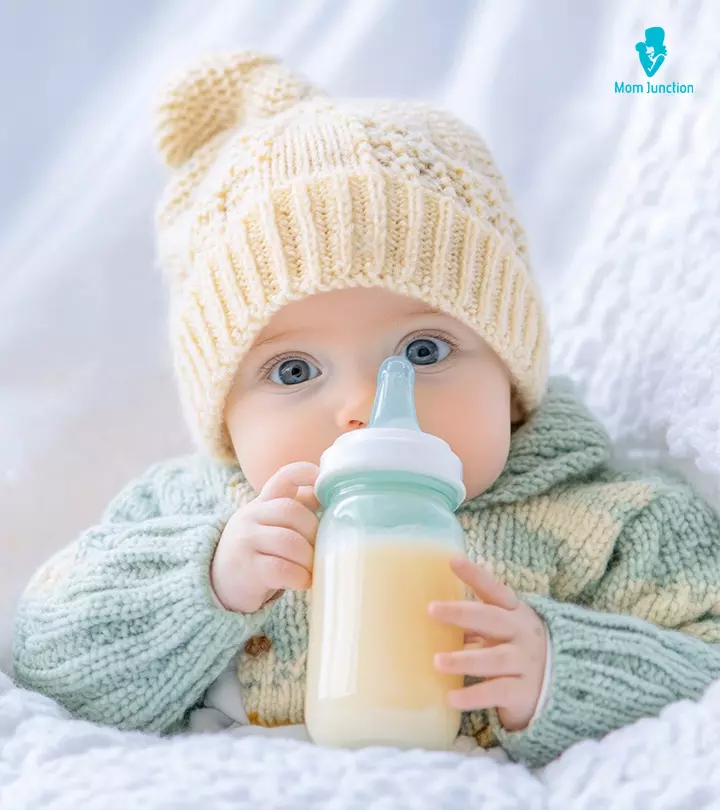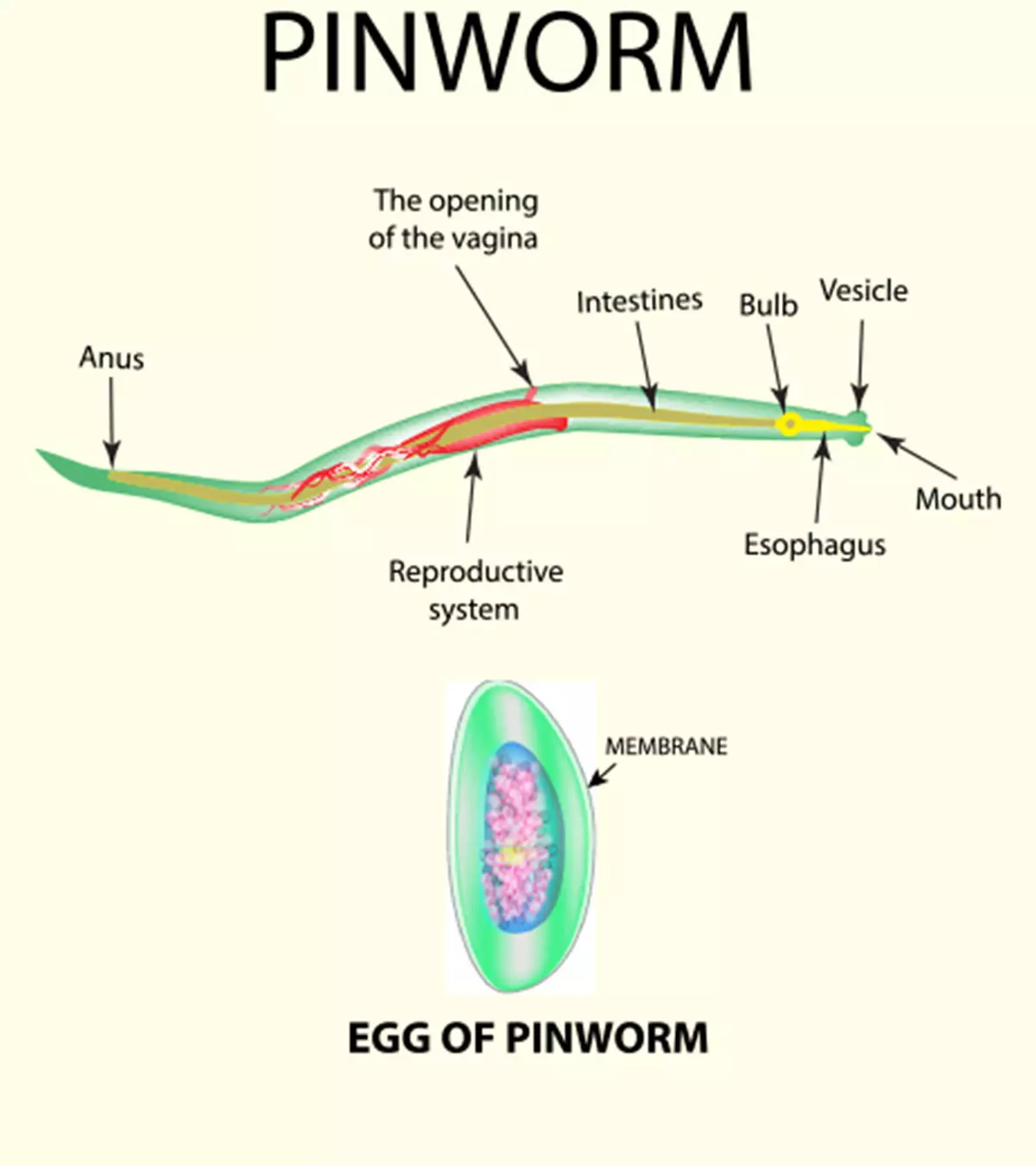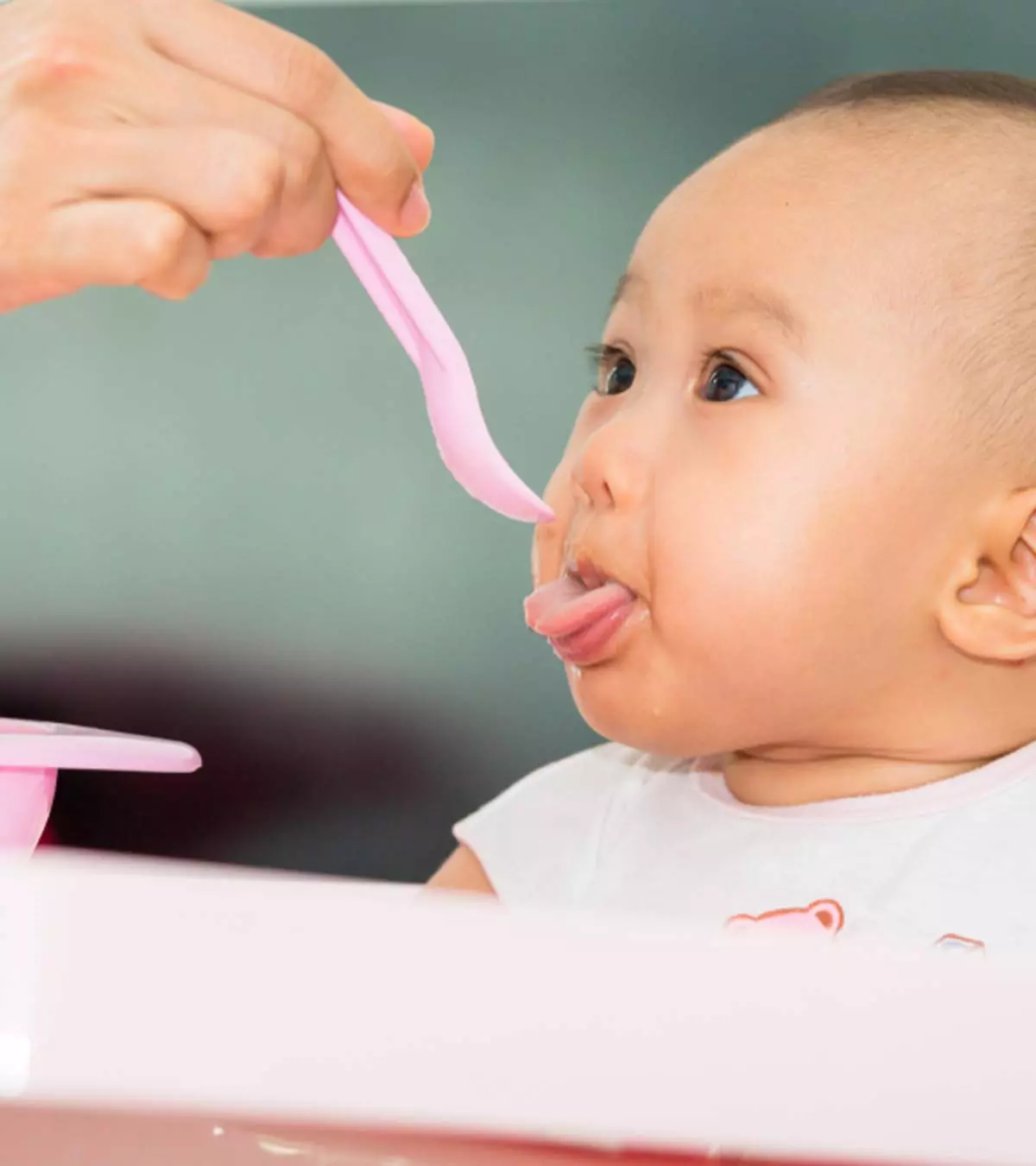
Image: Midjourney/ MomJunction Design Team
Many parents find it convenient to refrigerate breast milk to keep it fresh for later consumption. Some teething babies may also prefer cold milk as it offers relief from pain. However, this raises a common question in the minds of many parents: can babies drink cold milk? According to the Centers for Disease Control and Prevention, babies can safely consume cold, warm, or room-temperature milk (1). However, ensure that the milk is neither too hot nor too cold for the baby.

Key Pointers
- Most babies can consume warm, slightly cold, or milk at room temperature.
- Cold milk takes less time to prepare, making traveling with a baby easier.
- However, if the foremilk and hindmilk are too cold, they will not mix properly.
Can Babies Have Cold Milk?

Your baby can drink breast milk at room temperature or slightly colder. It does not necessarily need to be warm (1). Board-certified diplomate of the Philippine Pediatric Society Dr. Maria Carmela Villania-Mamauag opines, “Expressed or pumped breastmilk is the best nutrition for an infant. As long as the milk is not spoiled, does not smell, taste, or look bad, has no contaminants, and is neither too cold nor too hot, it remains a suitable source of nutrition for the baby.”
Brooklyn-based board-certified pediatrician Dr. Edward Kulich opines, “The nutritional value of cold breast milk is identical to warm breast milk, as long as it’s shaken to mix any congealed fats. Your baby may not like the cold sensation, but nutritionally, it’s fine.”
While there is no evidence-based research specifically addressing cold or chilled milk consumption in infants, some sources suggest that healthy, full-term, and older babies can safely drink chilled milk (2). Hence, you should discuss feeding cold milk to your baby with the baby’s pediatrician and then decide between cold and warm milk according to the baby’s health status and preference. It is recommended to use breast milk or formula, rather than cow’s milk, to meet the baby’s nutritional needs before your child turns one year old (3).
A study done on preterm infants has found that they can tolerate cold milk without any significant impact on body temperature or mesenteric blood flow and may even enhance certain aspects of their feeding performance (4).
However, if your baby prefers only warm milk, you may use bottle warmers that work for bottle-feeding or expressed breastmilk (5). You may also place the bottle in warm water to make the milk warm (2). Avoid using a microwave to thaw or heat breast milk, as it can damage the nutrients and compromise its quality (6). Always test the milk temperature on your wrist to ensure it’s safe before feeding.
Pros Of Giving Baby Cold Breastmilk Or Formula
South Africa-based pediatrician Dr. Elna Gibson says, “Babies can have cold milk depending on how and under what circumstances it is given. It poses no health risk and retains its nutritional value, making it a convenient option for feeding.” While there are no scientifically proven benefits of giving cold breast milk or formula milk to your baby, there are some practical advantages in terms of ease of use.
- Feeding the baby with cold milk is easier, especially during nighttime feedings, as heating the milk takes time and effort.
- Feeding cold milk helps eliminate the risk of overheating the milk, which is not good for the baby, as it may lead to mouth blisters.
- If the baby is used to drinking cold milk, it makes traveling easier. You can directly give expressed milk or bottle feed and need not worry about warming the milk.
 Point to consider
Point to consider
Cons Of Giving Baby Cold Breastmilk Or Formula
Here are some cons of feeding cold milk to your baby (3):
- If breastfed babies drink warm milk regularly, they may refuse to drink milk from cold or refrigerated bottles.
- Feeding cold milk to a premature newborn may not be a good choice. You should warm up the milk before feeding it to the baby.
- Sometimes it may be difficult to mix a bottle of cold breast milk properly because the hindmilk and foremilk may separate. This may adversely affect the nutritional content of the breast milk.
Frequently Asked Questions
1. Can a baby drink cold milk and achieve optimum weight gain?
Milk is a crucial contributing factor to your baby’s weight gain and overall nourishment. Also, there is no evidence saying cold milk can reduce weight gain. However, increasing the amount per feed may help a premature infant become healthier as it nourishes the body and increases their fat intake (7).
2. Can babies drink cold milk when they have a cold?
While there’s no evidence of the side effects of babies drinking cold milk during a cold, you should avoid giving them anything cold if it irritates their throat.
3. Can babies drink cold milk in the middle of the night?
While there is no specific evidence suggesting harm, babies may not be receptive to cold milk in the middle of the night. Cold milk may stimulate a baby to awaken more so than warm milk and it is possible that they may not fall back asleep as easily.
4. Can babies drink milk straight from the fridge?
There is no clear evidence that babies cannot drink milk straight from the refrigerator. However, since babies are sensitive and still building their immune system, it is better to feed moderately cool or warm milk or refer to special health advice.
5. Can cold milk cause constipation in babies?
There is no evidence that cold milk causes constipation. Usually it is a component of the mother’s diet in the breastmilk that causes a change to bowel habits. Rice and dairy, such as cow milk for babies, can also be culprits when the baby is moving to solid foods. If your breastfed baby is constipated, review your diet and determine what may be causing the baby to react this way. Constipation in older or non-breastfed babies is usually due to a diet low in fiber, consumption of too much cow’s milk or dehydration. If constipation continues, contact your pediatrician (8).
6. Does cold milk upset a baby’s stomach?
According to the US Centers for Disease Control and Prevention (CDC), there is no need to warm the breast milk before giving it to the baby. You may give it at room temperature or cold. No evidence shows that cold breast milk causes stomach upset in babies (5). Dr. Po-Chang Hsu, MD, from the Boston Metropolitan Area, says, “Some parents worry that cold breast milk could upset their baby’s stomach, but no scientific evidence supports this. Babies can handle milk at cooler temperatures, and any fussiness is more likely due to unfamiliarity than discomfort.”
7. How long is cold breast milk good for babies?
You may store expressed breast milk in the refrigerator for up to four days. It can be stored in the freezer for six months. Although it is acceptable to store for 12 months or even more, the quality can be affected (5).
8. How long can cold breast milk sit out?
Newly expressed breast milk can stay out for nearly four hours at room temperature 77°F or colder. You may store it in an insulated cooler with ice for upto 24 hours. Once the cold or frozen breast milk is warmed or brought to room temperature, you should use it within two hours (5). However, if you see a change in the appearance, smell, and taste of the breast milk, these are some signs of how to tell if breast milk is bad.
9. What should I do if my baby refuses cold breast milk?
A baby may refuse cold breast milk if the milk is too cold or if they are habituated to drinking warm milk. In such cases, check the milk’s temperature and monitor their reaction. You can gradually introduce cold milk by mixing it with warmer milk to help them adjust. Make sure to mix the breast milk well to distribute the nutrients evenly. You should also consult your pediatrician for guidance on handling feeding preferences in your baby.
Babies may have cold or warm milk, depending on how and under what circumstances the milk is given. Although cold milk may not cause any harm to the baby, make sure you mix it well and your baby is healthy enough to drink cold milk. However, if you are feeding your baby expressed breast milk, you need not worry about the temperature since it is naturally a safe moderate warm. If you are still wondering – can babies drink cold milk, you may consult your doctor to know about the safest options for your baby.
Infographic: Is There A Particular Way To Thaw Frozen Breast Milk?
Expressed breast milk may be given to your baby at room temperature or even cold, and warming is not necessary. However, the proper method of thawing frozen breast milk ensures your baby’s safety. The infographic below shares some essential tips to follow.
Some thing wrong with infographic shortcode. please verify shortcode syntax
Some thing wrong with illustration image shortcode. please verify shortcode syntax
Learn about the suitability of cold milk for babies in this informative video. Explore the advantages and disadvantages of offering your infant cold milk and discover essential safety measures to follow.
References
- Storage And Preparation Of Breast Milk.
https://www.cdc.gov/breastfeeding/pdf/preparation-of-breast-milk_H.pdf - Heating Expressed Breast Milk.
https://www2.hse.ie/babies-children/breastfeeding/expressing-pumping/heating-breast-milk/ - Feeding Your Baby and Toddler (Birth to Age Two).
https://www.mottchildren.org/posts/your-child/feeding-your-baby-toddler#:~:text=Do%20not%20give%20your%20baby - Louisa Ferrara et.al; (2025); From Warm to Cold: Feeding Cold Milk in Preterm Infants with Uncoordinated Oral Feeding Patterns.
https://pmc.ncbi.nlm.nih.gov/articles/PMC11213204/ - Tips For Bottle Feeding Your Baby.
https://www.nct.org.uk/information/baby-toddler/feeding-your-baby-or-toddler/tips-for-bottle-feeding-your-baby - Breast Milk Storage and Preparation.
https://www.cdc.gov/breastfeeding/breast-milk-preparation-and-storage/handling-breastmilk.html?CDC_AAref_Val=https://www.cdc.gov/breastfeeding/recommendations/handling_breastmilk.htm#cdc_generic_section_7-safe-thawing-of-breast-milk - Breastfeeding Frequently Asked Questions (FAQ).
https://www.cdc.gov/breastfeeding/php/faq/faq.html - Nutrition Newsletter Constipation Treatment For Infants And Children.
https://hsc.unm.edu/medicine/departments/pediatrics/divisions/continuum-of-care/pdf/constipation-treatment-infants-children.pdf - Once Baby Arrives – Food Safety for Moms to Be.
https://www.fda.gov/food/people-risk-foodborne-illness/once-baby-arrives-food-safety-moms-be
Community Experiences
Join the conversation and become a part of our nurturing community! Share your stories, experiences, and insights to connect with fellow parents.
Read full bio of Mindy Cockeram
- Dr. Maria Carmela Villania-Mamauag is a board certified diplomate of the Philippine Pediatric Society with a degree of Doctor of Medicine from Our Lady of Fatima University, Valenzuela City and a Bachelor in Science in Psychology from Saint Louis University, Baguio City which was augmented by a year of Bachelor in Science in Family Life and Child development at the University of the Philippines, Diliman, Quezon City.
 Dr. Maria Carmela Villania-Mamauag is a board certified diplomate of the Philippine Pediatric Society with a degree of Doctor of Medicine from Our Lady of Fatima University, Valenzuela City and a Bachelor in Science in Psychology from Saint Louis University, Baguio City which was augmented by a year of Bachelor in Science in Family Life and Child development at the University of the Philippines, Diliman, Quezon City.
Dr. Maria Carmela Villania-Mamauag is a board certified diplomate of the Philippine Pediatric Society with a degree of Doctor of Medicine from Our Lady of Fatima University, Valenzuela City and a Bachelor in Science in Psychology from Saint Louis University, Baguio City which was augmented by a year of Bachelor in Science in Family Life and Child development at the University of the Philippines, Diliman, Quezon City. - Dr. Elna Gibson is a general pediatrician. She did her MBChB and specialization as a pediatrician in South Africa at the University of Pretoria. She obtained MMed Pediatrics (masters) with distinction in 1993.
 Dr. Elna Gibson is a general pediatrician. She did her MBChB and specialization as a pediatrician in South Africa at the University of Pretoria. She obtained MMed Pediatrics (masters) with distinction in 1993.
Dr. Elna Gibson is a general pediatrician. She did her MBChB and specialization as a pediatrician in South Africa at the University of Pretoria. She obtained MMed Pediatrics (masters) with distinction in 1993. - Dr. Edward Kulich is a board-certified pediatrician, a fellow of the American Academy of Pediatrics, and the American Academy of Home Care Physicians. He obtained his Doctor of Medicine from St. George's University School of Medicine, completed a residency in Pediatrics at Maimonides Medical Center, Infants and Children’s Hospital of Brooklyn, and maintains privileges at Cornell, Lenox Hill, Mt. Sinai, and NYU hospitals. He has over 15 years of experience and is the current president of the American Academy of Concierge Pediatricians. Dr. Kulich is the author of The Best Baby Sleep Book and The Best OLSAT Book.
 Dr. Edward Kulich is a board-certified pediatrician, a fellow of the American Academy of Pediatrics, and the American Academy of Home Care Physicians. He obtained his Doctor of Medicine from St. George's University School of Medicine, completed a residency in Pediatrics at Maimonides Medical Center, Infants and Children’s Hospital of Brooklyn, and maintains privileges at Cornell, Lenox Hill, Mt. Sinai, and NYU hospitals. He has over 15 years of experience and is the current president of the American Academy of Concierge Pediatricians. Dr. Kulich is the author of The Best Baby Sleep Book and The Best OLSAT Book.
Dr. Edward Kulich is a board-certified pediatrician, a fellow of the American Academy of Pediatrics, and the American Academy of Home Care Physicians. He obtained his Doctor of Medicine from St. George's University School of Medicine, completed a residency in Pediatrics at Maimonides Medical Center, Infants and Children’s Hospital of Brooklyn, and maintains privileges at Cornell, Lenox Hill, Mt. Sinai, and NYU hospitals. He has over 15 years of experience and is the current president of the American Academy of Concierge Pediatricians. Dr. Kulich is the author of The Best Baby Sleep Book and The Best OLSAT Book. 
Dr. Po-Chang Hsu is a medical doctor and medical content expert. He received his medical degree from Tufts University School of Medicine in Boston in 2016. Previously, he did a master’s degree at Harvard University and wrote a thesis on neuroimaging in schizophrenia patients at Brigham and Women’s Hospital. He currently works at Alpas Wellness.
Dr. Po-Chang Hsu is a medical doctor and medical content expert. He received his medical degree from Tufts University School of Medicine in Boston in 2016. Previously, he did a master’s degree at Harvard University and wrote a thesis on neuroimaging in schizophrenia patients at Brigham and Women’s Hospital. He currently works at Alpas Wellness.
Read full bio of Swati Patwal
Read full bio of Rohit Garoo
Read full bio of Ghazia Shah


















